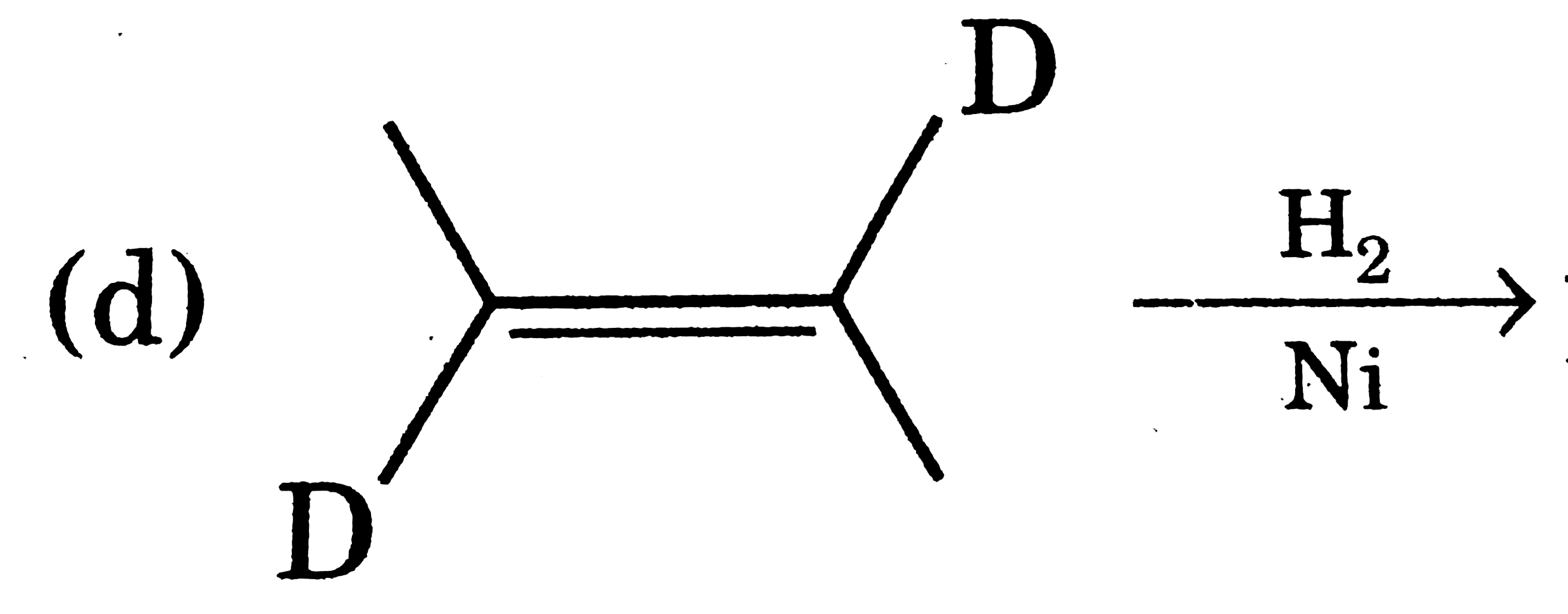Select correct statement:
Methane connot be prepared by catalytic hydrogenation of alkene.
All isomers of the formula C6H14 can be prepared by catalytic hydrogenation of alkene.
All isomers of the formula C5H12 can be prepared by catalytic hydrogenation of alkene.
 Product optained show no optical rotation
Product optained show no optical rotation
The correct Answer is:A, B, D
To solve the question, we need to evaluate the given statements regarding hydrocarbons and catalytic hydrogenation. Let's analyze each statement step by step.
1. Statement A: Methane cannot be prepared by catalytic hydrogenation of alkene.
- Analysis: Methane (CH₄) is the simplest alkane, while alkenes are hydrocarbons with at least one double bond (C=C). The simplest alkene is ethene (C₂H₄). When we perform catalytic hydrogenation on an alkene, we add hydrogen (H₂) across the double bond, resulting in an alkane. For example, hydrogenating ethene yields ethane (C₂H₆), not methane. Therefore, this statement is correct.
2. Statement B: All isomers of formula C₆H₁₄ can be prepared by catalytic hydrogenation of alkene.
- Analysis: The molecular formula C₆H₁₄ corresponds to hexane, which has several structural isomers. By starting with different alkenes (which can have various structures), we can indeed produce all the isomers of hexane through catalytic hydrogenation. Therefore, this statement is correct.
3. Statement C: All isomers of C₅H₁₂ can be prepared by catalytic hydrogenation of alkene.
- Analysis: The molecular formula C₅H₁₂ corresponds to pentane, which has several isomers. However, one of the isomers, neopentane (2,2-dimethylpropane), cannot be formed from any alkene because it requires a carbon atom to form five bonds, which is impossible. Therefore, this statement is incorrect.
4. Statement D: The product obtained from hydrogenation of a compound containing deuterium shows no optical rotation.
- Analysis: When a compound with chiral centers undergoes hydrogenation, if the product forms a racemic mixture (equal amounts of enantiomers), it will not show optical rotation. The presence of deuterium (D) instead of hydrogen (H) does not affect the optical activity in this case. Therefore, this statement is correct.
Conclusion:
The correct statements are A, B, and D.
Final Answer:
- Correct Statements: A, B, and D.
- Analysis: Methane (CH₄) is the simplest alkane, while alkenes are hydrocarbons with at least one double bond (C=C). The simplest alkene is ethene (C₂H₄). When we perform catalytic hydrogenation on an alkene, we add hydrogen (H₂) across the double bond, resulting in an alkane. For example, hydrogenating ethene yields ethane (C₂H₆), not methane. Therefore, this statement is correct.
- Analysis: The molecular formula C₆H₁₄ corresponds to hexane, which has several structural isomers. By starting with different alkenes (which can have various structures), we can indeed produce all the isomers of hexane through catalytic hydrogenation. Therefore, this statement is correct.
- Analysis: The molecular formula C₅H₁₂ corresponds to pentane, which has several isomers. However, one of the isomers, neopentane (2,2-dimethylpropane), cannot be formed from any alkene because it requires a carbon atom to form five bonds, which is impossible. Therefore, this statement is incorrect.
- Analysis: When a compound with chiral centers undergoes hydrogenation, if the product forms a racemic mixture (equal amounts of enantiomers), it will not show optical rotation. The presence of deuterium (D) instead of hydrogen (H) does not affect the optical activity in this case. Therefore, this statement is correct.
The correct statements are A, B, and D.
- Correct Statements: A, B, and D.
Topper's Solved these Questions
- HYDROCARBON (ALIPHATIC)Book:GRB PUBLICATIONChapter:HYDROCARBON (ALIPHATIC)Exercise:Comprehension Type-1
Explore 3 Videos
- HYDROCARBON (ALIPHATIC)Book:GRB PUBLICATIONChapter:HYDROCARBON (ALIPHATIC)Exercise:Comprehension Type-2
Explore 3 Videos
- HYDROCARBON (ALIPHATIC)Book:GRB PUBLICATIONChapter:HYDROCARBON (ALIPHATIC)Exercise:Reasoning Type
Explore 15 Videos
- GRAPHICAL INTERPRETATIONBook:GRB PUBLICATIONChapter:GRAPHICAL INTERPRETATIONExercise:Subjective Type
Explore 23 Videos
- HYDROGEN AND ITS COMPOUNDSBook:GRB PUBLICATIONChapter:HYDROGEN AND ITS COMPOUNDSExercise:Subjective type
Explore 8 Videos

